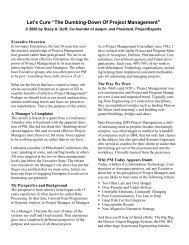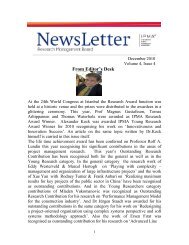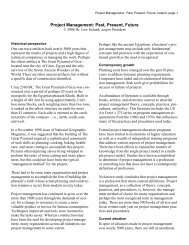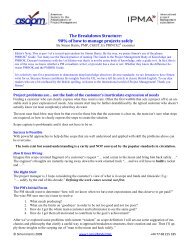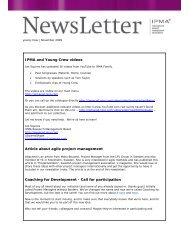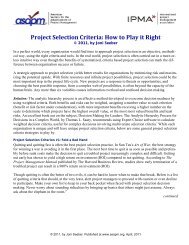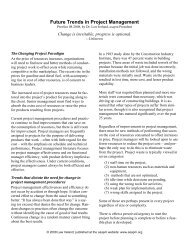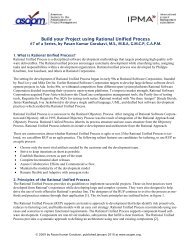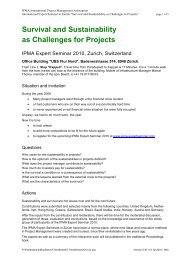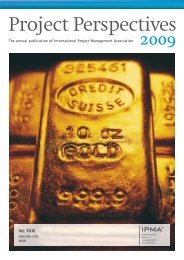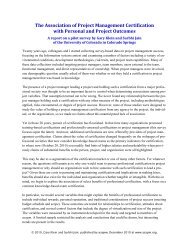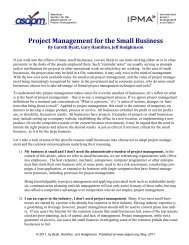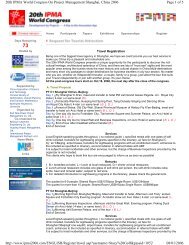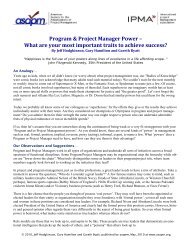Create successful ePaper yourself
Turn your PDF publications into a flip-book with our unique Google optimized e-Paper software.
US<br />
®<br />
<strong>Project</strong> <strong>Lessons</strong> <strong>through</strong> <strong>Chess</strong><br />
PrezSez 062009, by Dr. Lew Ireland, <strong>asapm</strong> President<br />
Games are often a representation of real life and in many aspects can be related to actual situations,<br />
either in the past or in the future. <strong>Chess</strong> has many of the attributes of a project – such as a<br />
life cycle, planning, strategy, limited resources (staff), resources with different capabilities, and<br />
decisions that determine success. <strong>Chess</strong>, like projects, is vast in terms of the number of variations<br />
and combinations of moves forward toward successful completion.<br />
<strong>Chess</strong> and projects have life cycles that initiate the game or<br />
project and culminate in success or failure. All things on this<br />
earth have a beginning and an end, except life in the hereafter.<br />
This linking of the beginning to the end is done <strong>through</strong><br />
various stages of maturity, which represent evolving phases<br />
of life <strong>through</strong> change.<br />
<strong>Project</strong> life cycles are a means of controlling the project advancement<br />
and signaling a shift in emphasis on the work to<br />
be accomplished. The traditional life cycle is Conceptual,<br />
Planning, Implementation, and Closeout. Regardless of the<br />
names associated with the divisions and the number of divisions,<br />
projects generally follow this model in the life of a<br />
project. Finer granularity and different industries use models<br />
that fit their needs.<br />
<strong>Project</strong>s might be compared to the game of chess where there are three phases – opening game,<br />
middle game, and end game. There are millions of options in the first ten moves. Fortunately,<br />
many of these opening moves are poor and should not be made if one plans to win the game by<br />
capturing the opponent’s king. The king, queen, rooks, bishops, and pawns are the resources for<br />
game, which is opposed by an equal number of resources.<br />
In both projects and chess, one cannot revert to a prior phase, but must struggle <strong>through</strong> while<br />
playing catch up. One must complete one phase before launching the next phase to ensure effective<br />
management of the process.<br />
• The life cycle is key to applying resources and managing actions that build on<br />
project/chess success<br />
• Understanding the life cycle and performing actions appropriate to the life cycle<br />
phase results in the best outcome for the project or chess game.<br />
In chess, phases are not planned in the future because the opposition controls some of what<br />
transpires. Transitioning to another phase is dependent upon progress made in chess moves and<br />
exerting influence on squares of the chess board. Going from the opening game too early in<br />
play often leaves one vulnerable to attack and an opponent’s easy checkmate. Delaying transition<br />
to the middle game can rely too much on a defensive posture that limits the opportunities<br />
for offensive moves that capture the opponent’s pieces (resources).<br />
© 2009 Lew Ireland; published at the <strong>asapm</strong> website: www.<strong>asapm</strong>.org
US<br />
®<br />
<strong>Project</strong> <strong>Lessons</strong> <strong>through</strong> <strong>Chess</strong>; Ireland, page 2<br />
• Transition between life cycle phases must be clear and distinct for proper man‐<br />
agement of the project or chess game.<br />
• Either too early or too late phase transitions create problems that must be resolved<br />
to ensure smooth performance.<br />
The opening chess game is typically five to seven moves where one develops a position on the<br />
board that attempts to control the center squares while creating a defensive barrier against the<br />
opposition. Both projects and chess games set the stage <strong>through</strong> early actions that affect the future<br />
implementation or middle game.<br />
• A slow start and poor positioning can adversely affect the subsequent activities.<br />
• The opening phase of either a project or chess has significant impact for follow on<br />
chess moves or activities in projects.<br />
The chess middle phase is an important function in that resources are traded to achieve both superior<br />
positioning and conservation of resources. The pawns are represented by a value of one,<br />
bishops and knights a value of three, rooks a value of five, and the queen a value of nine. The<br />
king, of course, has no assigned value because if it is checkmated, the game is over. Those who<br />
exchange pieces on the chess board need to consider the value of the resource being traded and<br />
why. An equal value trade off is not always a good move.<br />
• The judicious consumption of resources in both projects and chess improves the<br />
opportunity to be successful.<br />
• One should gain greater value when using resources than the assessed value.<br />
<strong>Chess</strong> is a game of strategy where the master players think as many as ten moves ahead. A good<br />
chess player may think from three to five moves ahead. Just responding to the opposing conditions<br />
is referred to in chess as “pushing wood”, or moving in response to a perceived threat.<br />
Always responding to threats is a defensive strategy and has only the opportunity for “accidental<br />
success.”<br />
• Both chess and managing projects requires thinking about future moves and activi‐<br />
ties to be successful.<br />
• Thinking <strong>through</strong> how planned actions affect future actions is considered the path<br />
to success.<br />
Viewing the chess board and paying attention to the games is critical to being as good as a person<br />
can be. An error made <strong>through</strong> a wrong move can be costly in terms of resources and sometime<br />
not recoverable. Attention to opposing forces is as important as husbanding ones resources.<br />
The exchange of a queen for a bishop results in a loss of six points in value.<br />
© 2009 Lew Ireland; published at the <strong>asapm</strong> website: www.<strong>asapm</strong>.org
US<br />
®<br />
<strong>Project</strong> <strong>Lessons</strong> <strong>through</strong> <strong>Chess</strong>; Ireland, page 3<br />
• It is important not to relax and become overconfident in either chess or projects –<br />
there is danger in the comfort zone.<br />
• Poor use of resources in the present affects the ability to be successful in the fu‐<br />
ture.<br />
<strong>Chess</strong> has rules that govern how the game is played and there are fundamental moves that set<br />
the stage for how the game develops. Significant variations from the fundamentals typically result<br />
in poor positioning, unnecessary loss of pieces (resources), random moves without thinking<br />
of the consequences, and, finally, loss of the game. Adhering to the fundamentals of the game<br />
gives the best opportunity for successfully capturing the opponent’s king.<br />
• Following the fundamentals in both chess and projects gives the best results for<br />
success.<br />
• Failure to follow <strong>through</strong> on the fundamentals typically results in failure.<br />
The end game in chess should be a clear-cut capture of the opponent’s king <strong>through</strong> perhaps<br />
less than five moves. It should be accomplished by a series of moves that forces the opponent to<br />
defend while slowly losing position on the chessboard and resources. The capture of the king<br />
should not be a surprise from a single move, but deliberate actions that lead to exerting pressure<br />
until the opponent’s king can no longer move away or block the threat.<br />
• Planning and following <strong>through</strong> on a series of actions that clearly lead to delivery of<br />
the final product defined as success is needed.<br />
• Final delivery should not be a surprise, but the result of deliberate, planned action.<br />
In Summary<br />
In summary, a game, such as chess, can teach one some basic<br />
lessons that can be used in managing projects. An overall strategy<br />
is needed in both games and projects to ensure that the<br />
progress is directly related to the end result desired. Sticking to<br />
the fundamental practices is perhaps the most promising path to<br />
achieve the desired end product. Risky moves and actions that<br />
violate foundation concepts will most often give poor results<br />
and rework or repositioning.<br />
<strong>Chess</strong>, like projects, has many unique and varied solutions. One<br />
should not attempt them all – just the solutions that work best in<br />
the environment present and under the conditions dictated by<br />
circumstances. Thinking <strong>through</strong> planned actions before implementation<br />
is perhaps the most valuable lesson learned from<br />
chess that needs to be applied to managing projects.<br />
© 2009 Lew Ireland; published at the <strong>asapm</strong> website: www.<strong>asapm</strong>.org
US<br />
®<br />
About the Author<br />
Lew Ireland, Ph.D.<br />
600 Dunbar Cave Road<br />
Clarksville, TN 37043<br />
Tel: 931.647.7373<br />
<strong>Project</strong> <strong>Lessons</strong> <strong>through</strong> <strong>Chess</strong>; Ireland, page 4<br />
Lew Ireland is an Executive <strong>Project</strong> Management Consultant based in<br />
Tennessee and serving both US and international clients. He has worked<br />
with clients to establish their project management systems to ensure they<br />
are supportive of the organizations’ respective goals. He is experienced in<br />
all phases of project management that include planning, scheduling, project office implementation,<br />
project maturity modeling, and project assessment.<br />
Lew has authored or co-authored project management books and articles for professional journals.<br />
He is a continual contributor to the American Society for the Advancement of <strong>Project</strong><br />
Management, regularly writing short articles for our website.<br />
Lew has a history of serving for nearly 25 years in volunteer positions to advance project management.<br />
He is past President and Chair of the <strong>Project</strong> Management Institute and has served in<br />
various positions within the Institute. He has been recognized by the Institute for his contributions<br />
by the Distinguished Contribution Award, Person of the Year, and elected a Fellow of the<br />
Institute.<br />
He serves as President of the American Society for the Advancement of <strong>Project</strong> Management<br />
(<strong>asapm</strong>), a not-for-profit professional society dedicated to more effective project management<br />
practices.<br />
© 2009 Lew Ireland; published at the <strong>asapm</strong> website: www.<strong>asapm</strong>.org




